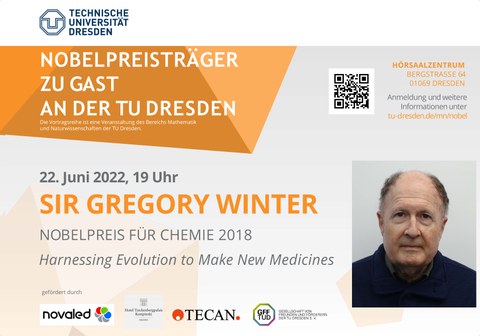Jun 18, 2022
Public lecture by Chemistry Nobel Laureate Gregory Winter
English molecular biologist revolutionizes the pharmaceutical industry
Evolution - the adaptation of species to different environments - has produced an enormous diversity of life. Gregory Winter has used the same principles - genetic modification and selection - to target the evolution of antibodies. Specifically, he used "phage display," a method in which a bacteriophage - a virus that infects bacteria with its genes - is used to engineer new proteins. Today, this method can be used to develop targeted antibody therapies for certain diseases, e.g. to treat rheumatoid arthritis or lupus, among others. They are also used as part of immunotherapy against cancer. For his achievements, he received in 2018, together with Frances H. Arnold and George P. Smith the Nobel Prize in Chemistry. Winter revolutionized the pharmaceutical industry with the introduction of antibody drugs and achieved tremendous commercial success.
He was co-head of the Protein and Nucleic Acid Chemistry and Biotechnology Division at the Laboratory of Molecular Biology in Cambridge, and previously deputy director at the Medical Research Council's Centre for Protein Engineering. In 1989, he was founder of Cambridge Antibody Technology (sold to Astra Zeneca in 2006), which developed the blockbuster drug Adalimumab (HUMIRA) (later further developed by Abbott Laboratories). It was the first antibody drug (a tumor necrosis factor inhibitor) on a purely human basis. In 2000, Winter founded Domantis (sold to GlaxoSmithKline in 2006) and Bicycle Therapeutics in 2009.
Details:
Wednesday, June 22, 2022. 7 p.m., Audimax, TU Dresden.
Sir Gregory Winter (GB; Nobel Prize in Chemistry 2018).
Harnessing evolution to make new medicines
The lecture is open to the public and will be held in English. Admission is free. Further information and registration at: https://tu-dresden.de/mn/nobel

